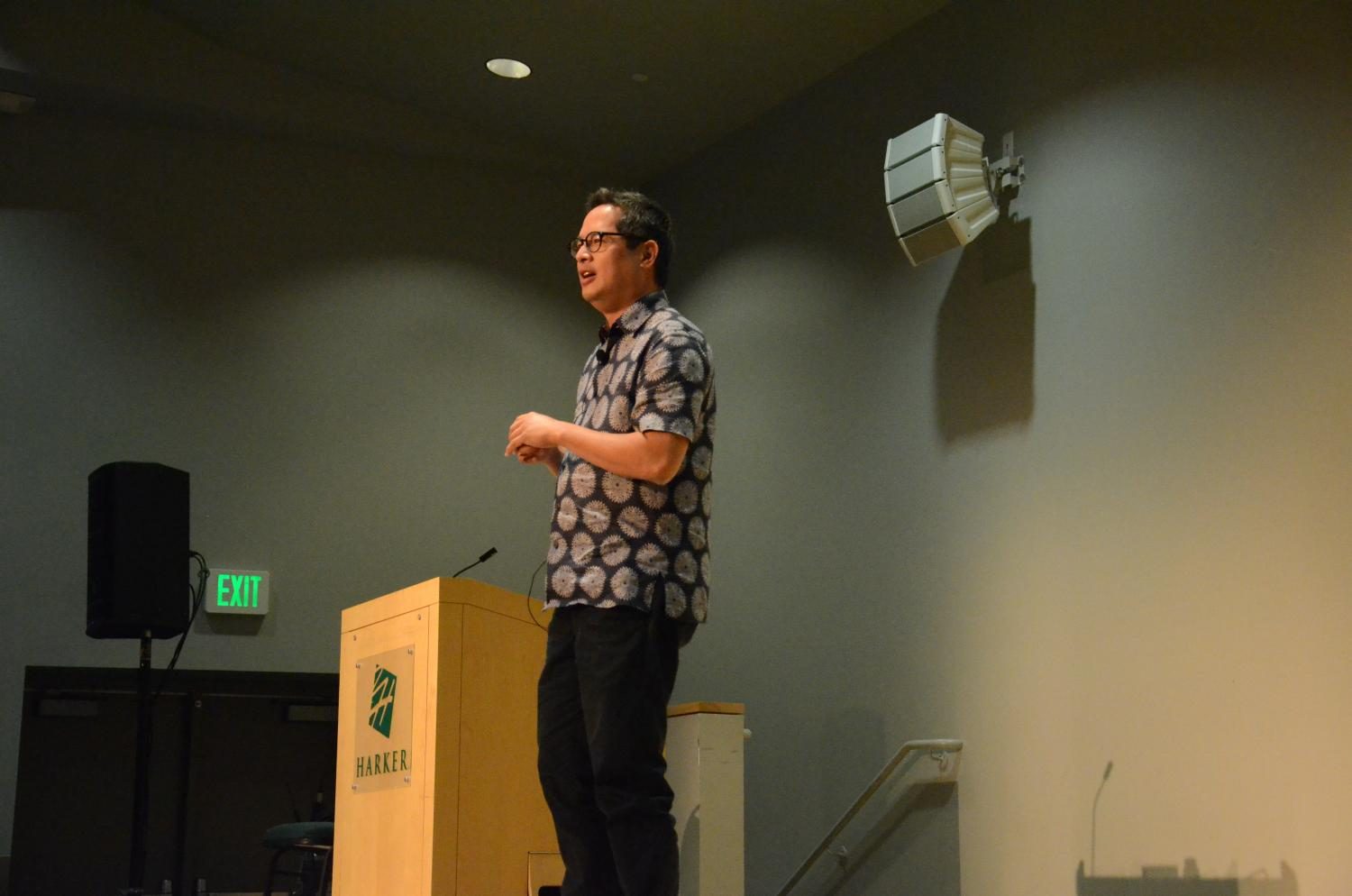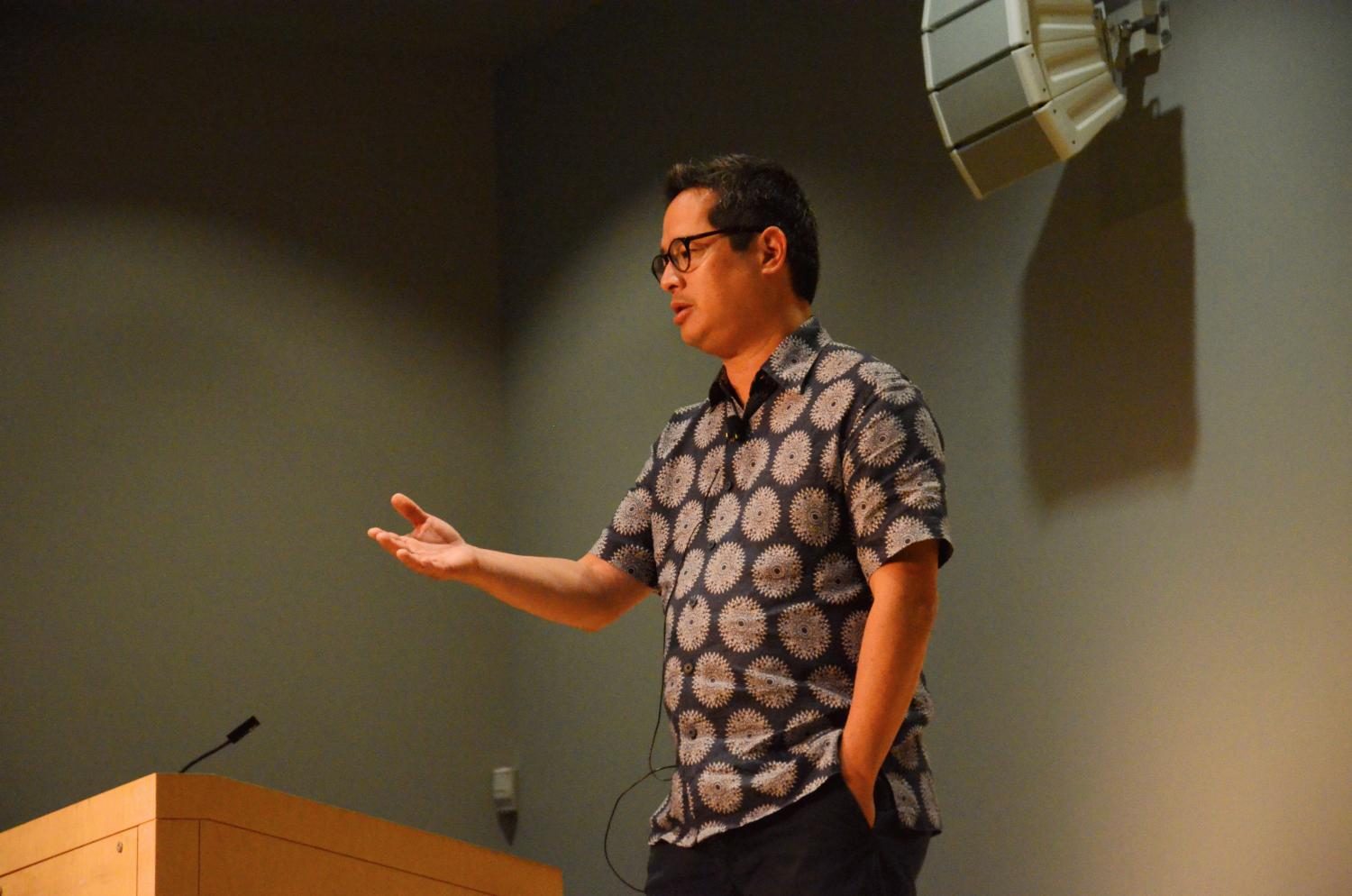Stanford cultural issues writer Jeff Chang speaks to upper school students and faculty
Executive Director of Stanford’s Institute for Diversity in the Arts Jeff Chang speaks about his cultural background as a native of Honolulu. He cited reggae, Hawaiian folk and Hawaiian guitar music as three main music styles that drew him to hip-hop.
August 31, 2017
Executive Director of Stanford’s Institute for Diversity in the Arts Jeff Chang spoke to upper school students and faculty during a long lunch Q&A session in Nichols Auditorium today.
Chang received a bachelor’s degree from UC Berkeley and a master’s degree in Asian American Studies from UCLA. He was named a USA Ford Fellow in Literature in 2008 by philanthropic arts organization United States Artists and one of “50 Visionaries Who Are Changing Your World” by American magazine Utne Reader in 2009.
The event was organized by the upper school’s Diversity Committee faculty members Pilar Aguero-Esparza, Mark Janda, Joshua Martinez and Lola Muldrew. Janda began the session by introducing Chang, who described his journey towards finding his passion for writing. He also gave short summaries of his four titles “Can’t Stop Won’t Stop: A History of the Hip-Hop Generation” (2005), “Who We Be: A Cultural History of Race in Post Civil Rights America“ (2014), “Who We Be: The Colorization of America“ (2014) and “We Gon’ Be Alright: Notes on Race and Resegregation” (2016).
“I took a long time to get to [being a writer] and if any of you want to ask how I got there, I could take the next hour talking to you about that. You don’t have to have decided what you need to do for the rest of your life by the time you enter college—not even after that,” he said. “I think in a very roundabout route I got to this place where I’ve been a writer, and I’ve been writing a lot about arts and culture—about cultural movements and about the question of race and identity for the last 25 years or so.”
Chang then opened the floor to questions from the audience. Askers used a microphone to relay their questions to Chang, who answered from the stage. Topics of discussion included the issues of ethnic diversity, combating extremism with peaceful protest, public movements, racial privilege, free speech and education equality.
“Our culture needs to be able to represent the diversity of the society that we now live in. At this particular point in history, we’re at a point now where diversity is the norm. It’s what we’re all supposed to be about,” he said. “Yet, if you look at the people who are making decisions about what the culture should be, the people making decisions on Hollywood, the people making decisions on Broadway, in the museums and TV and all other kinds of places—it’s still very much what it looked like all the way back to the early 1900s.”
https://www.youtube.com/watch?v=4VfbJJkOCjw
At the end the Q&A session, the Diversity Committee invited audience members with more questions to stay behind and speak to Chang at the stage. Prior to the session, Chang also participated in a discussion of his title “We Gon’ Be Alright” with 39 reading group student members and the faculty members of the Diversity Committee for ReCreate Reading.
For those interested in reading Chang’s material, “Can’t Stop Won’t Stop,” “Who We Be: A Cultural History of Race in Post Civil Rights America,” “Who We Be: The Colorization of America” and “We Gon’ Be Alright” are all available at the upper school library.


















![“[Building nerf blasters] became this outlet of creativity for me that hasn't been matched by anything else. The process [of] making a build complete to your desire is such a painstakingly difficult process, but I've had to learn from [the skills needed from] soldering to proper painting. There's so many different options for everything, if you think about it, it exists. The best part is [that] if it doesn't exist, you can build it yourself," Ishaan Parate said.](https://harkeraquila.com/wp-content/uploads/2022/08/DSC_8149-900x604.jpg)




![“When I came into high school, I was ready to be a follower. But DECA was a game changer for me. It helped me overcome my fear of public speaking, and it's played such a major role in who I've become today. To be able to successfully lead a chapter of 150 students, an officer team and be one of the upperclassmen I once really admired is something I'm [really] proud of,” Anvitha Tummala ('21) said.](https://harkeraquila.com/wp-content/uploads/2021/07/Screen-Shot-2021-07-25-at-9.50.05-AM-900x594.png)







![“I think getting up in the morning and having a sense of purpose [is exciting]. I think without a certain amount of drive, life is kind of obsolete and mundane, and I think having that every single day is what makes each day unique and kind of makes life exciting,” Neymika Jain (12) said.](https://harkeraquila.com/wp-content/uploads/2017/06/Screen-Shot-2017-06-03-at-4.54.16-PM.png)








![“My slogan is ‘slow feet, don’t eat, and I’m hungry.’ You need to run fast to get where you are–you aren't going to get those championships if you aren't fast,” Angel Cervantes (12) said. “I want to do well in school on my tests and in track and win championships for my team. I live by that, [and] I can do that anywhere: in the classroom or on the field.”](https://harkeraquila.com/wp-content/uploads/2018/06/DSC5146-900x601.jpg)
![“[Volleyball has] taught me how to fall correctly, and another thing it taught is that you don’t have to be the best at something to be good at it. If you just hit the ball in a smart way, then it still scores points and you’re good at it. You could be a background player and still make a much bigger impact on the team than you would think,” Anya Gert (’20) said.](https://harkeraquila.com/wp-content/uploads/2020/06/AnnaGert_JinTuan_HoHPhotoEdited-600x900.jpeg)

![“I'm not nearly there yet, but [my confidence has] definitely been getting better since I was pretty shy and timid coming into Harker my freshman year. I know that there's a lot of people that are really confident in what they do, and I really admire them. Everyone's so driven and that has really pushed me to kind of try to find my own place in high school and be more confident,” Alyssa Huang (’20) said.](https://harkeraquila.com/wp-content/uploads/2020/06/AlyssaHuang_EmilyChen_HoHPhoto-900x749.jpeg)







